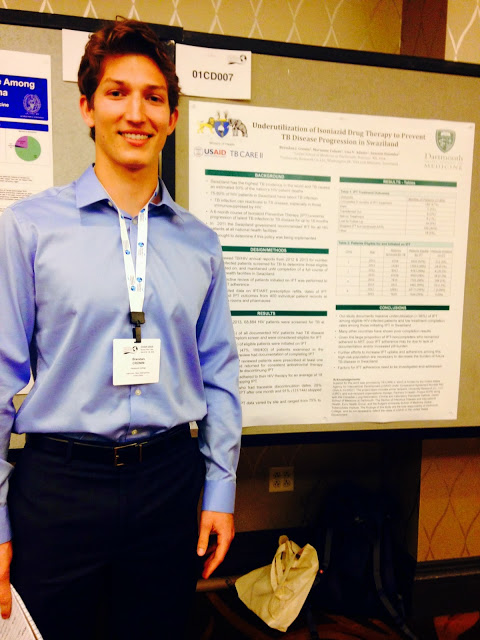- Public Policy
- Leadership
- Funding
- News & Events
- About the Center
Back to Top Nav
Back to Top Nav
Back to Top Nav
Back to Top Nav
Students reflect on the opportunities provided to them by the Rockefeller Center's Mini-Grants program through this ongoing series. The Mini-Grants program funds registration fees for students attending conferences relevant to the Rockefeller Center's mission as well as the costs of bringing speakers to the Dartmouth campus.
Presenting a scientific poster on my research in Swaziland at the Consortium of Universities for Global Health's (CUGH) sixth annual conference, entitled "Mobilizing Research for Global Health," was a recent culminating experience in my global health ambitions. The conference challenged me to reflect on the difficulties that a discipline like medicine presents and consider the myriad opportunities that medicine and health can provide. During the conference, in addition to presenting my poster on preventive Tuberculosis therapy in Swaziland, I listened in on many plenary speaker sessions and was fortunate enough to have individual conversations with several of the speakers.
 |
| Brendan Cronin '15 presents his research at a conference for the first time at CUGH's 2015 conference. |
The main message I garnered from my three day experience was that the field of medicine and the MD degree offer an incredible diversity in future opportunities at both the outset of one's career and also later on. Specifically, the conference opened my eyes to the fact that Craig Venter, the first person to sequence the human genome and someone who does primarily genetic sequencing research, was getting involved in public health initiatives by providing the ability to synthetically write genetic code and manufacture vaccines six days after the discovery of a new virus outbreak.
CUGH's conference, with scientists brought together from diverse disciplines to tackle some of the most challenging global health issues, emphasized the importance of integration across disciplines and the incorporation of all fields of science – genetics, biology, ecology, anthropology even veterinary medicine – to providing a comprehensive solution to emerging and existing problems. Before the conference I maintained an idea that all people working on global health had master’s degrees in public health and primarily conducted study design focused on improving quality with the World Health Organization, but this event really changed my perspective on who can participate in the field of global health and how one can start off in one career in medicine and end up in a completely different one, an idea and flexibility that greatly appeals to me.
 |
| Plenary Speaker Jonna Mazet emphasis the importance of interdisciplinary collaboration. |
Another takeaway from the conference stems from a session I attended with Atul Gawande, a well-known physician and author who writes for The New Yorker. In preparation for the session, I read a compilation of his essays from The New York Times and his new book, Being Mortal. In the session and in the essays, Gawande raises numerous moral challenges that doctors face nearly every day in their profession. He emphasizes how doctors have a particularly unique and difficult moral challenge in that their jobs require responsibility for other individuals' health and survival. The challenges that Gawande struggles with in his book range from compliance, to ethics around treatment and how far doctors should be involved, how much power one individual should have over another, and even things like how and how much doctors should be paid or what vaccines are worth.
The conference made me reflect on the many challenges that physicians have to grapple with that never arise in other professions as well as the depth, value, and difficulty this adds to pursuing a career in medicine.
-Written by Brendan Cronin '15